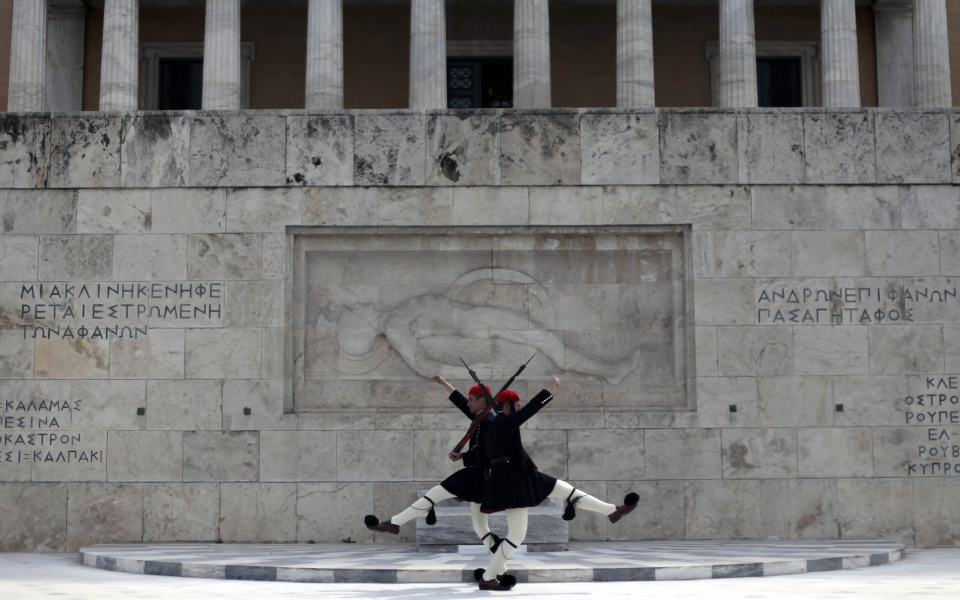Greece is celebrating its bicentennial; at least, it is if we begin calculations from the beginning of the revolution. The country’s course so far has been adventurous, and today’s Greece has very little in common with the Greece of 1821. But how can we imagine the third century that is unfolding before us? Perhaps taking a holistic look at each of the two centuries of Greece’s existence will offer some insight.
The first centennial
During the first centennial of the Greek nation, the completion of the nation was the predominant vision or ideal. The nation that resulted from the revolution was not particularly appealing: it was poor, small and did not possess significant funds, nor any executive infrastructure. In addition, the largest and most dynamic portion of Greeks lived outside its geographical borders. Thus, the goal of national completion was established on three pillars. The first was the creation of a “kingdom prototype,” a western-style governmental structure, in an Ottoman province.
The second was the creation of a cohesive nation, as a population of illiterate farmers and stock-breeders with exceptionally limited local horizons needed to be transformed into conscious citizens of a modernist nation, sharing a common and cohesive national consciousness.
Finally, the third pillar was territorial expansion; initially at the expense of the Ottoman Empire, still a very powerful state despite its decline, and then at the expense of the newly established Balkan nations – Bulgaria in particular – that had their own policies that did not always agree with the Greek dream.
All three of these goals had mostly been achieved by 1921. The country featured a modern “Weberian” state that may not have been as effective or wealthy as its Western counterparts, but still structured along the same lines. The swift and mass growth of primary education led to the creation of a cohesive nation, and the large military exploits of the early 20th century had succeeded in doubling the country’s territory. Of course, this success would be tainted by the National Schism and the Greco-Turkish War that would follow, one year later. Of course, neither of these events can negate the fact that, to a large degree, the goal of national completion had mostly been achieved.
The second centennial
The early years of the second centennial of modern Greece was marked by the end of the Megali Idea (the “Great Idea,” the aim of which was to establish Greek control over the area once ruled by the Byzantine Empire). Soon, the nation would set a new grand goal: to escape the ravages of poverty and underdevelopment. This goal would be achieved via industrialization and the country’s institutional modernization. Rather remarkably, Greece managed to absorb and remediate more than one million refugees and, in 1928, the great effort towards industrialization began.
Speaking from Thessaloniki in February of 1930, Eleftherios Venizelos announced his firm faith in the country’s future, making a comparison between two dates: 1830 and 1930. He asked, what was Greece in 1830? A series of ruins, a political abomination that few considered viable, with a limited population and no noteworthy towns or cities. The terms under which this state was created rendered its growth precarious, with minimal income and almost inexistent political experience. Its romantic adoption of the Great Idea led to dead-end maximalisms. Yet despite these negative circumstances, Venizelos continued, this political abomination managed to survive and grow, tripling its territory, increasing its population ninefold and its wealth hundreds of times over.
In essence, he explained, a nation that had achieved so much within just one century would have no difficulty making “new advancements, that few of us are even able to imagine today” during the course of its second century of existence.
Greece may have had to endure the great economic crisis of the 1930s, the Second World War and the Greek Civil War but, in the end, Venizelos’ prediction was not far from the truth; over the course of the next 100 years, the country achieved its goal of making underdevelopment a thing of the past. Despite the difficulties and challenges, today Greece is a rich, democratic nation: an equal member of the largest alliance of the most developed democracies in the world.
Our collective birthday
Can we project from 1921 and 2021 on to 2121? Of course not, because the things that change extend beyond anything our minds could ever imagine. Yet, it is interesting to play with this idea. This type of projection could posit that, after the double-shock of the economic crisis in 2010 and the pandemic in 2020, the country would set a new post-modern goal, one that goes beyond conventional economic development, based on a radically different perception of the relationship between humans and their surroundings.
This would be similar in scope to the ideological shifts that occurred in 1821, when the country’s leaders first imagined the nation, or in 1923, when they envisioned the modern nation state. This projection would also highlight the same great ambition to redefine the country’s position within the world’s leading nations, drawing on our rich experience in overcoming crises and catastrophes.
As we look upon the dawning of our third century, we could even repeat the words Venizelos spoke in 1930, with some minor alternations: “How can anyone say that this nation – that has achieved so much despite its poor starting point – cannot make new advancements during the third century of its independent existence, advancements that only few of us are able to imagine today?”
Stathis N. Kalyvas is a political scientist and Gladstone Professor of Political Science, Oxford University.












